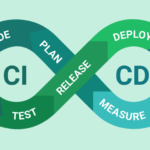Understanding the Core DevOps Principles
DevOps, a portmanteau of Development and Operations, represents a set of practices aimed at bridging the gap between software development and IT operations. At its core, DevOps principles emphasize continuous integration, continuous deployment, collaboration, and automation. These principles are pivotal for startups and enterprise applications alike, fostering an environment of efficiency, reliability, and rapid delivery.
Continuous integration (CI) involves the frequent merging of code changes into a shared repository, followed by automated testing to detect issues early. This practice ensures that the codebase remains in a deployable state, reducing integration headaches and facilitating quicker iterations. Continuous deployment (CD), on the other hand, extends CI by automating the release of validated code changes to production environments. Together, CI/CD pipelines streamline the development process, enabling faster feedback loops and more robust software delivery.
Collaboration is another cornerstone of DevOps. By fostering a culture of open communication and shared responsibility, DevOps breaks down silos between development and operations teams. This collaborative approach not only enhances problem-solving capabilities but also aligns the team’s objectives with the organization’s goals, promoting a sense of unified purpose. Automation further underpins these principles by minimizing manual interventions, thereby reducing human error and accelerating repetitive tasks.
The importance of a cultural shift towards DevOps practices cannot be overstated. For startups, adopting DevOps early on can provide a competitive edge by enabling rapid innovation and agility. For enterprise applications, DevOps facilitates scalability and resilience, ensuring that large-scale systems can evolve smoothly without compromising stability. Companies like Netflix and Amazon have successfully implemented DevOps, showcasing the transformative power of these principles. Netflix’s automated deployment pipeline allows it to release code thousands of times per day, while Amazon’s emphasis on CI/CD has significantly reduced its lead time for changes.
In essence, understanding and implementing core DevOps principles is essential for any organization looking to thrive in today’s fast-paced digital landscape. By embracing continuous integration, continuous deployment, collaboration, and automation, both startups and enterprises can achieve improved efficiency, innovation, and customer satisfaction.
Tailoring DevOps for Startup Applications
For startups, embracing DevOps principles can be both a daunting and transformative endeavor. Given their typically limited resources and pressing need for rapid iteration, startups must adopt a pragmatic approach to DevOps to ensure efficiency and scalability. One of the primary challenges for startups is the balancing act between development speed and operational stability. This balance can be achieved through a strategic implementation of DevOps practices that are tailored to the unique demands of a startup environment.
Startups can leverage cloud services to alleviate some of the resource constraints they face. Cloud platforms such as Amazon Web Services (AWS), Google Cloud Platform (GCP), and Microsoft Azure offer scalable infrastructure that can grow with the startup. These platforms provide a suite of tools that facilitate continuous integration, continuous delivery (CI/CD), and automated testing, which are core components of DevOps. By utilizing these services, startups can avoid the upfront costs and complexities associated with maintaining physical servers and infrastructure.
Choosing the right tools is also crucial for the successful implementation of DevOps in a startup. Open-source tools like Jenkins, Docker, and Kubernetes are widely adopted due to their flexibility and community support. These tools can help in automating workflows, managing containerized applications, and orchestrating deployments, thereby enhancing productivity and enabling rapid iteration. Additionally, integrating version control systems like Git allows for better collaboration and tracking of changes, which is essential in a fast-paced startup environment.
Creating a minimum viable product (MVP) with DevOps practices involves iterative development and frequent releases. This approach allows startups to gather user feedback promptly and make necessary adjustments, fostering a culture of continuous improvement. DevOps practices such as automated testing and deployment pipelines ensure that each iteration is stable and reliable, reducing the time spent on manual processes and minimizing the risk of errors.
Real-world case studies demonstrate the success of startups that have adopted DevOps. For instance, companies like Slack and Airbnb have leveraged DevOps to scale rapidly and maintain high-quality service delivery. These examples highlight the importance of integrating DevOps from the outset, enabling startups to build robust, scalable applications that can adapt to changing market demands.
Scaling DevOps for Enterprise Applications
As enterprise applications grow in complexity, the integration of DevOps principles becomes increasingly crucial. Large enterprises often face unique challenges that differ significantly from those encountered by startups. One of the primary hurdles is the integration of DevOps into existing legacy systems. These systems, often deeply ingrained in an organization’s operations, require a tailored approach to ensure seamless transition without disrupting ongoing processes.
Handling large-scale deployments is another critical aspect. Enterprises must manage extensive codebases and numerous environments, making automation and orchestration vital. Implementing continuous integration and continuous deployment (CI/CD) pipelines can facilitate these large-scale deployments, ensuring that updates are delivered consistently and reliably across the organization.
Compliance and security are paramount in enterprise environments. The introduction of DevOps practices must align with stringent regulatory standards and data protection laws. Therefore, incorporating security measures from the outset—often referred to as DevSecOps—can help in identifying vulnerabilities early in the development cycle. Automated testing and monitoring tools can be employed to maintain compliance and secure the software development lifecycle.
Fostering collaboration across large, distributed teams is essential for successful DevOps adoption in enterprises. Establishing clear communication channels and utilizing collaborative platforms can bridge the gap between development and operations teams. Regular cross-functional meetings and shared objectives can also enhance teamwork and ensure that everyone is aligned towards common goals.
Maintaining consistent performance across the board is another key consideration. Implementing robust monitoring and logging mechanisms can provide insights into system performance and help in proactively addressing any issues that arise. This, in turn, contributes to a more stable and reliable production environment.
Practical examples of enterprise-level DevOps transformations include companies like Netflix and Amazon. Netflix’s transition to a microservices architecture, coupled with its emphasis on automation and CI/CD, has enabled it to scale efficiently. Similarly, Amazon’s adoption of DevOps principles has facilitated rapid deployment cycles and improved overall service reliability.
In summary, scaling DevOps for enterprise applications involves addressing the complexities of legacy systems, managing large-scale deployments, ensuring compliance and security, fostering collaboration, and maintaining consistent performance. By adopting these best practices, enterprises can navigate the challenges and reap the benefits of a robust DevOps framework.
Emerging DevOps Trends and Principles for 2024
As we look ahead to 2024, the DevOps landscape continues to evolve, bringing with it new trends and principles that are set to shape the future of software development and operations. One of the most significant trends is the increasing integration of artificial intelligence (AI) and machine learning (ML) into DevOps processes. These technologies are being leveraged to enhance predictive analytics, automate routine tasks, and improve decision-making capabilities. AI and ML can help identify potential issues before they become critical, thereby reducing downtime and increasing efficiency.
Another emerging trend is the rise of GitOps, a paradigm that uses Git repositories as the source of truth for all deployment and operational processes. GitOps enhances collaboration and transparency, making it easier to manage infrastructure and application lifecycles. By utilizing GitOps, organizations can achieve more consistent and reliable deployments, which is particularly beneficial for startups looking to streamline their development workflows.
Observability is gaining prominence as a crucial aspect of DevOps. Unlike traditional monitoring, observability focuses on providing a comprehensive view of system performance and behavior, enabling teams to gain deeper insights into their applications. This holistic approach helps in diagnosing issues more efficiently and improving overall system reliability. For both startups and enterprises, investing in observability tools can lead to better performance optimization and faster incident resolution.
The shift towards more integrated security practices, known as DevSecOps, is another key trend for 2024. As cyber threats become increasingly sophisticated, embedding security into the DevOps pipeline is essential. DevSecOps ensures that security is considered at every stage of the development lifecycle, from initial design to deployment. This proactive approach helps in identifying vulnerabilities early, reducing the risk of security breaches.
Industry experts predict that these trends will significantly impact both startups and enterprises. Startups can leverage AI, GitOps, and observability to scale rapidly and efficiently, while enterprises can benefit from the enhanced security and reliability that DevSecOps offers. To stay ahead of the curve, organizations should invest in continuous learning and adopt these emerging principles to remain competitive in the fast-paced DevOps environment.



